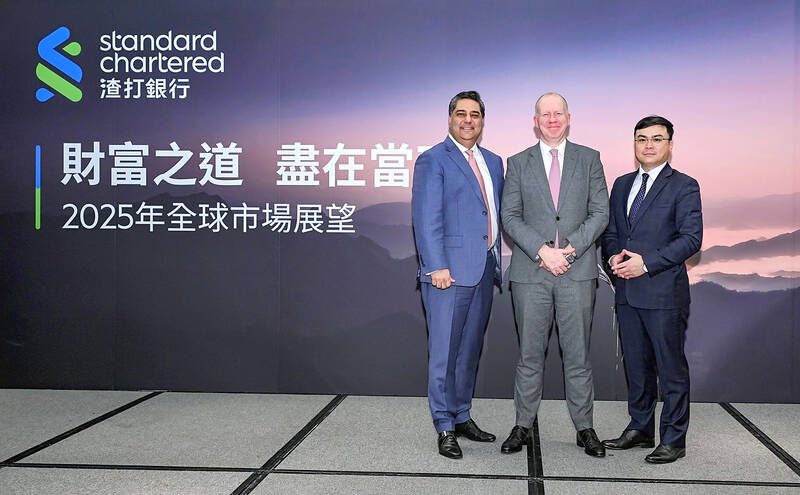Standard Chartered Bank is entering 2025 overweight in equities and gold, as the global economy remains resilient with GDP forecast to grow 3 percent.
The markets will focus on incoming US president-elect Donald Trump’s policies, particularly the balance between pro-business measures, and trade and immigration concerns, the UK-headquartered lender said.
“We are overweight in global equities, supported by positive growth and policy backdrop,” Singapore-based global chief investment officer Steve Brice told a news conference in Taipei on Tuesday.

Photo courtesy of Standard Chartered Bank
While their valuations are high, earnings growth would drive returns, said Brice, who leads a team of over 25 professionals that saw an increase of 16 percent and 13 percent in its growth and balanced strategies respectively last year.
In regional preferences, the firm is overweight in US equities, pointing out that Trump’s electoral win has lifted business confidence through expected tax cuts and deregulation, despite potential tariff impacts.
Brice is forecasting a 45 percent chance of “soft-landing” and a 40 percent chance of “no-landing” in the US economy, with a mounting likelihood of “no landing.”
Brice favors a soft-landing scenario as it indicates a continued slowdown in inflation.
Central bank policies would remain crucial, with the Federal Reserve poised to cut rates to 3.75 percent toward the year-end, looking past temporary inflation from tariffs and immigration policies, Brice said.
Europe and China would debate easing and Japan stands alone in raising rates, he said.
Standard Chartered is underweight in the euro area given the region’s weak growth and trade concerns. Political uncertainty in France and Germany would weigh on investor sentiment, he said.
The firm has mixed views about Asia. It is neutral on China equities, as the economy is waiting for stronger stimulus to come out of the woods.
China would seek to offset US import curbs with higher exports to other markets and augment stimulus to boost domestic demand, Brice said.
Lingering US-China tensions, alongside structural concerns such as a property sector downturn and deflationary worries, would continue to tether share price momentum, he said.
The lender also has a neutral view on Japan equities, as they remain vulnerable to swings in the yen carry trade despite improving share buybacks and the reflationary environment.
However, the firm is overweight in Indian equities as India’s return on equity remains strong on the back of robust domestic inflows and relative insulation from overseas trade tensions, he said.
Standard Chartered Bank is also positive about gold, expecting its price to rise to US$2,900 per ounce in next 12 months, propelled by demand from global central banks and geopolitical risks.
Additionally, the firm is switching from cash to dollar-based bonds to lock in attractive yields over the longer term, Brice said.
Within bonds, Standard Chartered favors developed market high yield bonds, looking at sustained credit quality in a soft-landing scenario, he said. It keeps a neutral stance on other bond categories in light of their elevated valuations.

MULTIFACETED: A task force has analyzed possible scenarios and created responses to assist domestic industries in dealing with US tariffs, the economics minister said The Executive Yuan is tomorrow to announce countermeasures to US President Donald Trump’s planned reciprocal tariffs, although the details of the plan would not be made public until Monday next week, Minister of Economic Affairs J.W. Kuo (郭智輝) said yesterday. The Cabinet established an economic and trade task force in November last year to deal with US trade and tariff related issues, Kuo told reporters outside the legislature in Taipei. The task force has been analyzing and evaluating all kinds of scenarios to identify suitable responses and determine how best to assist domestic industries in managing the effects of Trump’s tariffs, he

TIGHT-LIPPED: UMC said it had no merger plans at the moment, after Nikkei Asia reported that the firm and GlobalFoundries were considering restarting merger talks United Microelectronics Corp (UMC, 聯電), the world’s No. 4 contract chipmaker, yesterday launched a new US$5 billion 12-inch chip factory in Singapore as part of its latest effort to diversify its manufacturing footprint amid growing geopolitical risks. The new factory, adjacent to UMC’s existing Singapore fab in the Pasir Res Wafer Fab Park, is scheduled to enter volume production next year, utilizing mature 22-nanometer and 28-nanometer process technologies, UMC said in a statement. The company plans to invest US$5 billion during the first phase of the new fab, which would have an installed capacity of 30,000 12-inch wafers per month, it said. The

Taiwan’s official purchasing managers’ index (PMI) last month rose 0.2 percentage points to 54.2, in a second consecutive month of expansion, thanks to front-loading demand intended to avoid potential US tariff hikes, the Chung-Hua Institution for Economic Research (CIER, 中華經濟研究院) said yesterday. While short-term demand appeared robust, uncertainties rose due to US President Donald Trump’s unpredictable trade policy, CIER president Lien Hsien-ming (連賢明) told a news conference in Taipei. Taiwan’s economy this year would be characterized by high-level fluctuations and the volatility would be wilder than most expect, Lien said Demand for electronics, particularly semiconductors, continues to benefit from US technology giants’ effort

‘SWASTICAR’: Tesla CEO Elon Musk’s close association with Donald Trump has prompted opponents to brand him a ‘Nazi’ and resulted in a dramatic drop in sales Demonstrators descended on Tesla Inc dealerships across the US, and in Europe and Canada on Saturday to protest company chief Elon Musk, who has amassed extraordinary power as a top adviser to US President Donald Trump. Waving signs with messages such as “Musk is stealing our money” and “Reclaim our country,” the protests largely took place peacefully following fiery episodes of vandalism on Tesla vehicles, dealerships and other facilities in recent weeks that US officials have denounced as terrorism. Hundreds rallied on Saturday outside the Tesla dealership in Manhattan. Some blasted Musk, the world’s richest man, while others demanded the shuttering of his